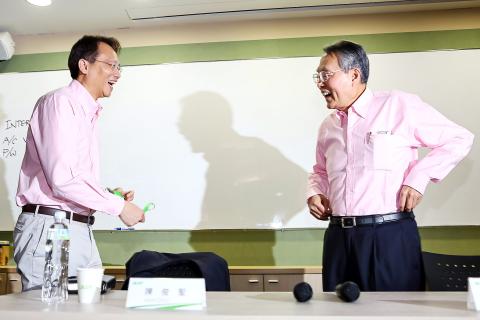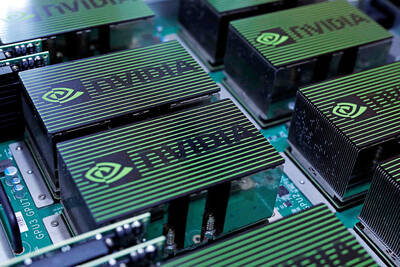Acer Inc (宏碁) plans to reach out to both individuals and enterprises to sell its “build your own cloud (BYOC)” online data storage services from next quarter as part of the company’s revival efforts after posting consecutive quarterly losses.
“The challenge that Acer is facing now is very huge,” newly appointed president and chief executive officer Jason Chen (陳俊聖) said yesterday.
“We have figured out a clear direction that Acer should follow to achieve its long-term goal, which is serving customers BYOC services, and with that goal established, we are going to take whatever measures we need to make that happen,” Chen told a press conference after taking office on Jan. 1.

Photo: Maurice Tsai, Bloomberg
Earlier last month, Acer unveiled its new business strategy, saying it aims to transform into a “hardware plus software and services” vendor.
As soon as April 1, all of Acer’s desktop, laptop, tablet and smartphone customers are to be able to access the BYOC platform from their devices, Chen said yesterday.
He said he expects the company to monetize its cloud technology services, but did not say when.
Chen, a former senior vice president of worldwide sales and marketing at Taiwan Semiconductor Manufacturing Co (TSMC, 台積電), the world’s largest contract chipmaker, was appointed chief executive by Acer’ s board of directors on Dec. 23 last year.
He said that before joining the company, his impression of Acer was that it was better at controlling costs than doing research and development, but he has since found that not to be the case.
Acer has assembled a big research group of more than 1,300 engineers, which is likely to grow further in the future, he said.
The company also applied for 130 technology patents in the third quarter of last year, ranking it second behind only Hon Hai Precision Industry Co (鴻海), the world’s largest contract electronics maker, Chen said.
However, he said the company’s losses over the past three years were due to its early entry into Ultrabooks and touch-enabled notebook PCs.
Chen said Acer’s move to sell Ultrabooks and touch-enabled laptops was “not entirely wrong,” but said the company had invested too early in these two sectors.
“It was brave for Acer to make the decision [to enter those markets], but the company invested too much and too early,” he said.
“What we need to do now is to dig ourselves out of the hole,” Chen added. “There are no magic bullets. We need to focus on the fundamentals.”
The company plans to continue selling hardware products, but that will be just a portion of Acer’s business, Chen said.
Acer chairman Stan Shih (施振榮), who accompanied Chen at the press conference yesterday, said the company’s move to bet on the touch-enabled market, which is backed by Microsoft Corp and its Windows 8 operating system, was proved to be “a misstep based on over-expectations.”
“Acer needs to learn from its past,” Shih said. “There’s a need for the company to stay cautious toward the market and avoid any further waste of resources.”
The company’s consolidated revenue for last year has dropped by 16.16 percent year-on-year to NT$360.19 billion (US$11.99 billion), the steepest decline among the world’s top five PC makers.
“We are now facing a quite challenging situation. It’s not easy for anyone or any company to deal with such a challenge,” Chen said.
The company’s shares closed down 0.81 percent at NT$18.45 yesterday.
Additional reporting by CNA

Leading Taiwanese bicycle brands Giant Manufacturing Co (巨大機械) and Merida Industry Co (美利達工業) on Sunday said that they have adopted measures to mitigate the impact of the tariff policies of US President Donald Trump’s administration. The US announced at the beginning of this month that it would impose a 20 percent tariff on imported goods made in Taiwan, effective on Thursday last week. The tariff would be added to other pre-existing most-favored-nation duties and industry-specific trade remedy levy, which would bring the overall tariff on Taiwan-made bicycles to between 25.5 percent and 31 percent. However, Giant did not seem too perturbed by the

AI SERVER DEMAND: ‘Overall industry demand continues to outpace supply and we are expanding capacity to meet it,’ the company’s chief executive officer said Hon Hai Precision Industry Co (鴻海精密) yesterday reported that net profit last quarter rose 27 percent from the same quarter last year on the back of demand for cloud services and high-performance computing products. Net profit surged to NT$44.36 billion (US$1.48 billion) from NT$35.04 billion a year earlier. On a quarterly basis, net profit grew 5 percent from NT$42.1 billion. Earnings per share expanded to NT$3.19 from NT$2.53 a year earlier and NT$3.03 in the first quarter. However, a sharp appreciation of the New Taiwan dollar since early May has weighed on the company’s performance, Hon Hai chief financial officer David Huang (黃德才)

NVIDIA FACTOR: Shipments of AI servers powered by GB300 chips would undergo pilot runs this quarter, with small shipments possibly starting next quarter, it said Quanta Computer Inc (廣達), which supplies artificial intelligence (AI) servers powered by Nvidia Corp chips, yesterday said that AI servers are on track to account for 70 percent of its total server revenue this year, thanks to improved yield rates and a better learning curve for Nvidia’s GB300 chip-based servers. AI servers accounted for more than 60 percent of its total server revenue in the first half of this year, Quanta chief financial officer Elton Yang (楊俊烈) told an online conference. The company’s latest production learning curve of the AI servers powered by Nvidia’s GB200 chips has improved after overcoming key component

UNPRECEDENTED DEAL: The arrangement which also includes AMD risks invalidating the national security rationale for US export controls, an expert said Nvidia Corp and Advanced Micro Devices Inc (AMD) have agreed to pay 15 percent of their revenue from Chinese artificial intelligence (AI) chip sales to the US government in a deal to secure export licenses, an unusual arrangement that might unnerve both US companies and Beijing. Nvidia plans to share 15 percent of the revenue from sales of its H20 AI accelerator in China, a person familiar with the matter said. AMD is to deliver the same share from MI308 revenue, the person added, asking for anonymity to discuss internal deliberations. The arrangement reflects US President Donald Trump’s consistent effort to engineer